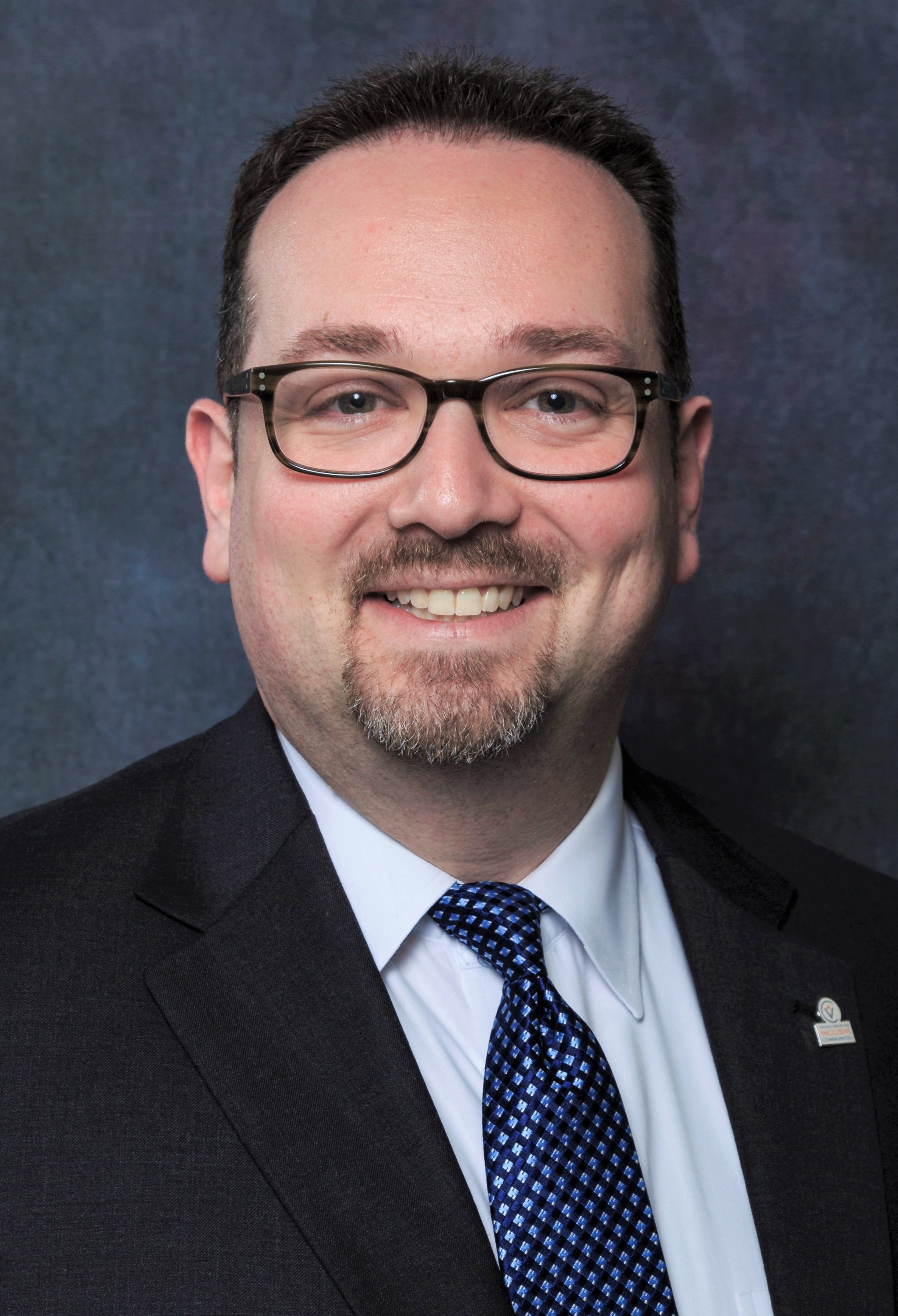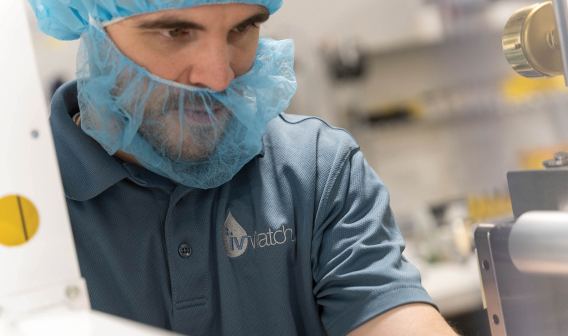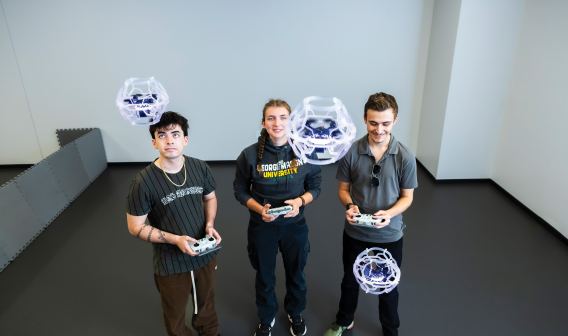
Jonathan Zur is president and CEO of the Virginia Center for Inclusive Communities (VCIC), a nonprofit organization based in the Richmond area that works with schools, businesses, and communities to promote inclusion. VEDP President and CEO Jason El Koubi spoke with Zur about VCIC’s mission, its activities, and the importance of pairing diversity with inclusion.
Jason El Koubi: Can you tell us about the Virginia Center for Inclusive Communities and its history and mission today?
Jonathan Zur: I draw a lot of inspiration from our organization’s long history back to 1935, when we were initially part of a national movement that was being led to address religious bigotry of the 1920s and ’30s. The story sounds like a bad joke — it is not. We were founded when a rabbi, priest, and minister got together. They went around the country to speak out against a rise in antisemitism and anti-Catholicism at the time. In many communities, it was the first time people had the chance to meet someone from a different denomination or religious background to ask questions and dispel stereotypes.
These religious leaders were invited to speak in Lynchburg, and nearly 1,000 people came out to hear them. It’s pretty remarkable to think about a gathering of that size at that time around those issues. Those who attended were so inspired, they said, “We need an organization doing this type of work in Virginia.”
They affiliated with the National Conference of Christians and Jews, or NCCJ, and formed a Virginia office. Over time, NCCJ’s work broadened to address issues more expansively, thinking about interfaith work, as well as to address issues of race and class, gender, sexual orientation, and immigration. We relaunched as the Virginia Center for Inclusive Communities in the early 2000s to become an independent organization in Virginia and to reflect the broader mission and work that had really captured our organization’s focus.
Today, my colleagues and I have the honor of working with schools, businesses, and community groups to help them achieve success through inclusion. We’re facilitating workshops, forums, and dialogues. What we think about in terms of our work is moving people from a process of awareness to action. We help people to understand concepts, to build empathy, to build motivation, to explore what types of skills they might utilize to make their spheres of influence more inclusive.
El Koubi: I’d love to hear about what’s exciting to you in this, and what the challenges are as you pursue this work.
Zur: I think what’s really exciting is the opportunity to work with a broad range of stakeholders. We’re in all corners of the Commonwealth. Sometimes that means working with folks who are very receptive and sometimes that means working with folks who are not as open to these concepts. We’re very intentional about being an organization that reaches as many people as possible.
We’ve also begun to do some work to help elevate the conversation and the tenor we’re seeing in some circles nationally, where we have concern around the state of dialogue, for example. Our organization recently developed and published a guide to constructive and inclusive dialogue to help people think about what it means to interact with folks who might have a different perspective, background, or worldview, and to be in community with those folks.
The other thing that has been meaningful has been a shift from one-time interactions with certain groups to long-term relationships. We’ve seen a real yearning with our partners around Virginia to go deeper than a one-time, check-off-the-box-type training.
El Koubi: How are we doing on this front as an American society in terms of advancing dialogue and diversity of ideas and including different voices?
Zur: We have a mixed grade. Some meaningful opportunities have emerged in recent years to go deeper than we had in the past. That, in some ways, is a sign of concern that we’re seeing some fraying of our social connectedness. I think that has been exacerbated by social media, where folks are able to live in echo chambers where they see things that affirm their worldview and potentially negate, ignore, or demonize other identities or perspectives. We don’t see great modeling from our national leaders in terms of what it means to connect well across lines of difference. So, I think there are some real concerns about the state of our civil society. At the same time, we’ve seen acknowledgment that previously had not existed of different groups, identities, and experiences, and there’s an opportunity that comes from that.
In some ways it feels like we’re in that moment as a society where some folks are saying, “We’ve been calling for change for a long time. It may feel messy right now, but it’s long overdue,” and we have others who say, “I was very comfortable the way things were.” I think part of our role at VCIC is to hold space for all those perspectives and ensure that we’re able to help folks learn along their journey to more inclusive and successful outcomes.
El Koubi: Why are diversity and inclusion important to business? What do businesses gain when they try to cultivate an organization that embraces diverse backgrounds and viewpoints?
Zur: A lot of research shows that diverse, inclusive teams produce better outcomes. There are a lot of reasons why that might be, and there are also reasons why institutions don’t benefit from diversity if they don’t have a culture that supports and leverages differences. It’s important to recognize that diversity and inclusion are different things. Diversity reflects the presence of difference. Inclusion reflects accepting, respecting, and valuing diversity.
To simply have diversity — to plop different people into a space and say, “Have at it” — does not necessarily result in positive outcomes for institutions. The work of achieving diversity is important and insufficient. So, that’s where inclusion comes in — thinking about how businesses can foster an environment where folks feel like their full selves, where they can contribute, where they look out for their colleagues, where they’re able to share innovative ideas and not feel like they’re going to be shut down. When we have those types of environments cultivated through professional development, inclusive policies, mentoring and training, and culture-building within organizations, that’s when we really benefit from the presence of difference.
El Koubi: What’s the role of leaders in fostering that kind of change in culture?
Zur: The challenge for leaders, I think, is that oftentimes organizations are set up to be most comfortable for the leader. In my organization, the processes we have in place are processes that are most comfortable for me. I have to start to think from a perspective of, “How is this process landing for someone else? How might somebody from a different background or perspective experience this communication?” Ultimately, it may not feel comfortable for me to make that shift, even though doing so is an opportunity to engage more people in caring about the success of our institution.
Leaders are critical to being models for openness to new ideas, for setting the tone and saying, “It’s not just about what I want. I want to think about and understand how our full team is experiencing this or what new ideas folks have.” Then, ultimately, leaders are responsible for enforcement when there are behaviors that may not align with stated values around inclusion.
El Koubi: How important is it to get buy-in from businesses and corporate partners in this work? When you think about the totality of your mission and what it would take to achieve it, how do you think about business in that context?
Zur: Businesses are a place where people often will interact with the most difference within their adult lives. We also sometimes see that in schools, depending on how our neighborhoods are set up. But if you think about an adult in the Commonwealth of Virginia, in many cases their neighborhood doesn’t have a lot of racial or religious difference. If they’re a member of a civic group or faith community, or are involved, if they have children, in their children’s lives, oftentimes they’re seeing folks who are like them. But when they enter a workplace, particularly a diverse workplace, they’re interacting with folks who are different from them. Businesses become a critical landing ground for Virginians to be able to build the skills to work across lines of difference and figure out how to engage with one another successfully.
This is about how we can be at our best. A workplace that has an inclusive environment is more innovative and more collaborative. There’s a higher level of retention and there’s higher commitment. When businesses can articulate the case for diversity and inclusion in an effective, coherent way, I think all of us hear that in a way that advances our shared priorities in Virginia. Businesses are critical partners in understanding and advancing a commitment to inclusion.
For the full interview, visit www.vedp.org/Podcasts




